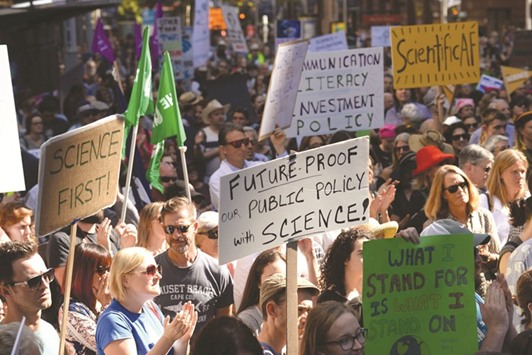“Climate change has been ground zero for alternative facts for many years now,” professor of climate science James Renwick said at the march in New Zealand’s capital Wellington.
Understanding the way the climate was changing was a science problem but working out how to deal with it was a social and a political problem, he said.
“We must have good science informing good policy,” he urged.
The Paris Agreement, the landmark 2015 climate accord from which US President Donald Trump has threatened to withdraw, was a great achievement in policy terms but action was necessary, he said.
“The election of President Trump and the possible exit of the United States from the Paris Agreement is a very disturbing development,” he added.
More than 600 pro-science satellite marches were planned around the world yesterday, with the main event in the US capital Washington expected to draw large crowds.
In London, biologists, physicists and astronomers were among those who participated in the protest.
Many expressed fears about the future of scientific research in Britain and its collaboration in international projects following the country’s exit from the European Union.
While 600 demonstrators gathered in Geneva, home to many international groups for the advancement of health and science, there were similar numbers out on the streets of Amsterdam and other European cities.
Marches were set for Berlin and 17 other cities in Germany.
There were rallies in 12 cities across Australia, where participants focussed on issues like climate change and the deterioration of the Great Barrier Reef.
“We do a lot of work on the Great Barrier Reef and we’ve seen first hand the devastation up there, and I just think there are some decisions being made that don’t have the best interests of our children’s future in mind,” Josh Madin, a science professor from Macquarie University, said in Sydney.
The protesters were showing their solidarity with colleagues in the United States protesting against the policies of the Trump administration.
Trump has rolled back an Obama-era moratorium on coal leasing on federal land and promised to review regulations on hydraulic fracturing, or fracking.
He also lifted a requirement that officials weigh the impact of climate change in decision making.
“I think science is probably more useful and more relevant to society today than it’s probably ever been. But there’s been a widening gap between science and the public,” said former Australian Liberal leader John Hewson at the Sydney rally.
“We need to stop and recognise the significance of science and the importance of funding it properly and using the evidence that it produces as the basis of good public policy,” he said.

